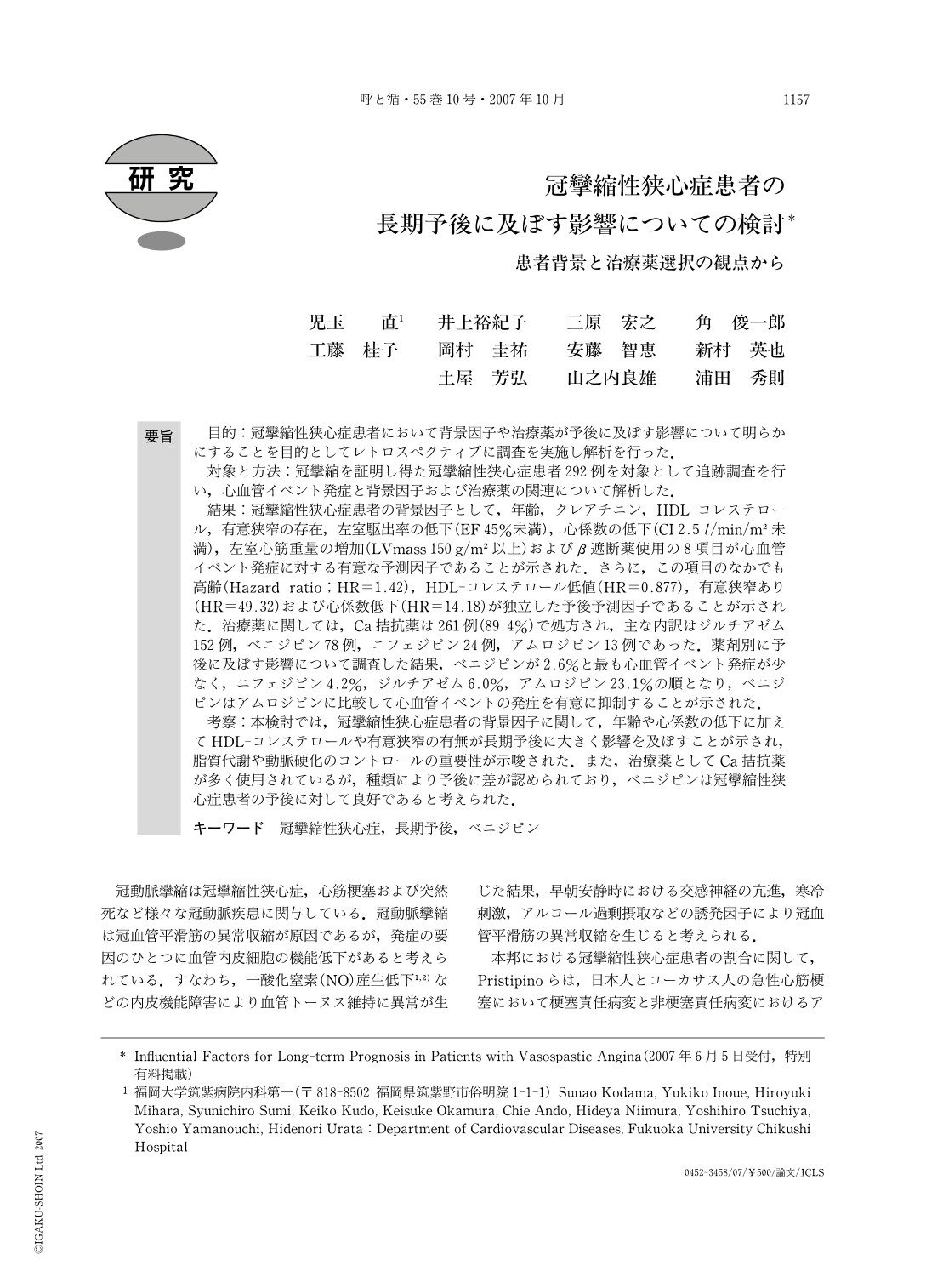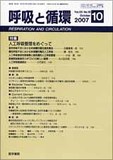Japanese
English
- 有料閲覧
- Abstract 文献概要
- 1ページ目 Look Inside
- 参考文献 Reference
要旨 目的:冠攣縮性狭心症患者において背景因子や治療薬が予後に及ぼす影響について明らかにすることを目的としてレトロスペクティブに調査を実施し解析を行った.
対象と方法:冠攣縮を証明し得た冠攣縮性狭心症患者292例を対象として追跡調査を行い,心血管イベント発症と背景因子および治療薬の関連について解析した.
結果:冠攣縮性狭心症患者の背景因子として,年齢,クレアチニン,HDL-コレステロール,有意狭窄の存在,左室駆出率の低下(EF45%未満),心係数の低下(CI2.5l/min/m2未満),左室心筋重量の増加(LVmass150g/m2以上)およびβ遮断薬使用の8項目が心血管イベント発症に対する有意な予測因子であることが示された.さらに,この項目のなかでも高齢(Hazard ratio;HR=1.42),HDL-コレステロール低値(HR=0.877),有意狭窄あり(HR=49.32)および心係数低下(HR=14.18)が独立した予後予測因子であることが示された.治療薬に関しては,Ca拮抗薬は261例(89.4%)で処方され,主な内訳はジルチアゼム152例,ベニジピン78例,ニフェジピン24例,アムロジピン13例であった.薬剤別に予後に及ぼす影響について調査した結果,ベニジピンが2.6%と最も心血管イベント発症が少なく,ニフェジピン4.2%,ジルチアゼム6.0%,アムロジピン23.1%の順となり,ベニジピンはアムロジピンに比較して心血管イベントの発症を有意に抑制することが示された.
考察:本検討では,冠攣縮性狭心症患者の背景因子に関して,年齢や心係数の低下に加えてHDL-コレステロールや有意狭窄の有無が長期予後に大きく影響を及ぼすことが示され,脂質代謝や動脈硬化のコントロールの重要性が示唆された.また,治療薬としてCa拮抗薬が多く使用されているが,種類により予後に差が認められており,ベニジピンは冠攣縮性狭心症患者の予後に対して良好であると考えられた.
The aim of the present study was to investigate the relationship between the long-term outcome of vasospastic angina(VSA) and the factor influencing its prognosis, including clinical characteristics and treatments. A total of 292 patients with VSA were followed up, and analyzed for predictors of coronary vascular events. The univariate analysis revealed that high age, elevated creatinine level, low HDL-choresterol level, presence of significant coronary stenosis, decreased left ventricular ejection fraction(LVEF: <45%), decreased cardiac index(CI: <2.5l/min/m2), increased left ventricular mass(LVmass: >150g/m2) and use of beta-blockers proved to be significant factors leading to poor prognosis. Four independent prognostic factors were shown by multivariate analysis with Cox proportional hazards model. They were high age(hazards rate; HR=1.42), low HDL-cholesterol level(HR=0.877), presence of significant coronary stenosis(HR=49.32) and decreased CI(HR=14.18). Two hundred and sixty-one patients(89.4%) were treated with calcium channel blockers: diltiazem at 152 pts, benidipine at 78 pts, nifedipine at 24 pts and amlodipine at 13 pts. Among the calcium channel blockers, the patients treated with benidipine had the lowest incidences of coronary vascular events. The incidence rate of coronary vascular events was 2.6% for benidipine, 4.2% for nifedipine, 6.0% for diltiazem and 23.1% for amlodipine. Benidipine showed a significantly better prognostic effect in patients with VSA than amlodipine. These results demonstrate that the influential factors for long-term prognosis of patients of VSA were high age, low CI or HDL-cholesterol and significant coronary stenosis, and they suggest the importance of management for lipid metabolism and arteriosclerosis. Although calcium channel blockers were frequently used in patients with VSA, only benidipine seemed effective for a good outcome.

Copyright © 2007, Igaku-Shoin Ltd. All rights reserved.


